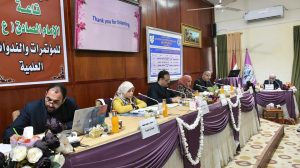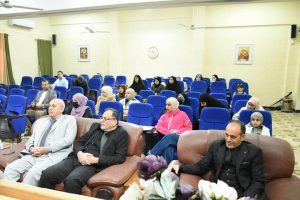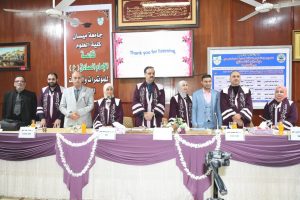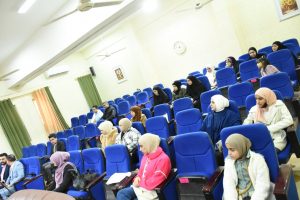A master’s thesis was discussed in the College of Science / Department of Biology
submitted by the student Heba Salah Khaled. Titled: – A study comparing the microbial
content of the intestine of people with type 2 diabetes and healthy people in Maysan /
Iraq. The study aimed to compare the effect of the intestinal microbiota content of
diabetic patients from Type 2 and non-infected individuals (comparison group), to detect
the most abundant types of bacteria, as (36) stool samples were collected from people
with Type 2 diabetes. (20) samples whose ages ranged between (30-50) years, and
healthy (16) samples with the same average age visited the Amarah Laboratory in
Maysan Province, for the period from September 2021 to February 2022. The first part
consisted of extracting deoxyribonucleic acid from stool samples It was conducted in the
Laboratory of Genetic Engineering and Molecular Biology in the Department of Biology
/ College of Science / University of Maysan. After that, the PCR technique was used to
amplify 16S rRNA primers, and the amplification products were sent to NGS Psomagen,
and the raw data were analyzed using bioinformatics tools and using alpha and beta
programs for the study of diversity. The results showed that there are many types of
bacteria in the human intestine, such as Firmicutes, Bacteriodetes, Verrucomicrobia,
Protobacteria, Lentisphaerae, Elusimicrobia, Tenericutes, Actinobacteria, and
Fusobacteria. Although there were no statistically significant differences between the two
groups.
The results also showed that Verrucomicrobia (2.9%) and Proteobacteria (12.70%)
(0.47%) Fusobacteria gave the highest rates in Type 2 diabetes compared to healthy
subjects (0.5%, 0.6% and 0.9%), respectively, while Firmicutes (36.78%) And
Bacteroidetes (44.89%), Tenericutes (0.195%), and Actinobacteria (0.34%) in patients
gave the lowest percentages in Type 2 diabetes compared to healthy subjects (39.9%,
47.6%, 1.7%, and 0.48%), respectively. A study of the microbial content of the intestine
as it relates to diabetes and other diseases such as cancer, autism, depression, diseases of
the cardiovascular system, etc. It recommended conducting the study on larger numbers
and for different age groups and studying it in other pathological conditions beyond
diabetes.
The discussion committee consisted of:
- Prof. Dr. Manaf Jawda Abdul Abbas University of Basra / Chairman.
- Prof. Dr. Zahra Adnan Dakhel / University of Misan / College of Science / Member.
- Assist. Prof. Dr. Ishraq Jassim Hassan / University of Misan / Member.
- Prof. Dr. Zahed Saadoun Aziz University of Misan / College of Science / member and
supervisor. - Dr. Hussam Rahim Mohammad University of Misan / member and supervisor.
On this occasion, the members of the discussion committee were honored by the Dean of
the College, Prof. Dr. Sabih Jassim Gatie who wrote a letter of thanks and appreciation
for their efforts to participate in the discussion, as well as their enduring the trouble of
travelling to build bridges of scientific cooperation between the University of Misan and
the rest of the universities.



